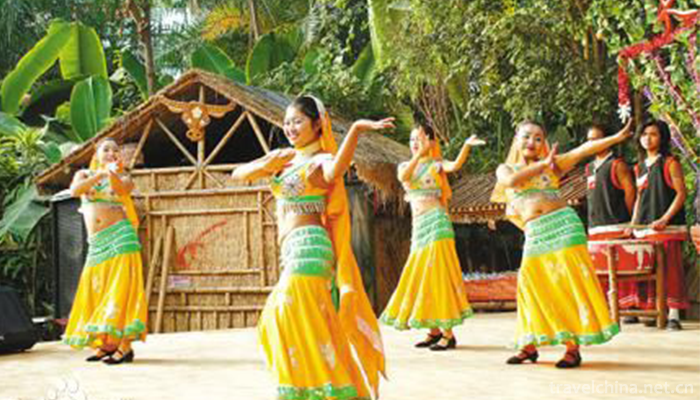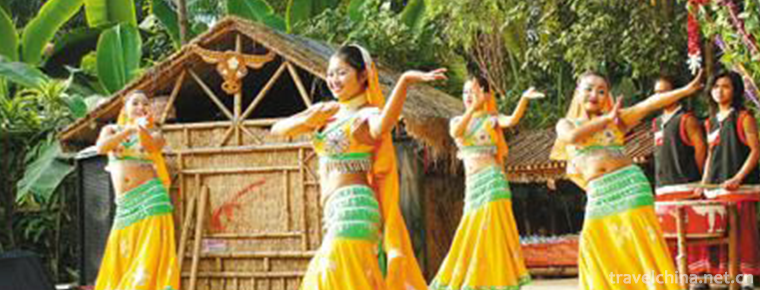Qing Opera of Wa Nationality
Qing Opera of Wa Nationality
The Wa Qing Opera belongs to the high-pitched system, with different roles for men and women. The roles are similar to those of Sheng, Dan, Jing and Wei. Use a dye called "Red Drug" to colour the face and show the person's identity.
Qing Opera of Wa Nationality is one of the representative excellent national literature and art in Tengchong County. It was selected into the second batch of national intangible cultural heritage list in 2008.
On June 7, 2008, the Wa Qing Opera was approved by the State Council to be included in the third batch of national intangible cultural heritage list.
A Brief History of Plays
The Sugarcane Village in Lotus Township, Tengchong County, is famous for its miraculous preservation and transmission of an ancient minority precious opera, Wa Qing Opera.
As early as the late Ming and early Qing Dynasties, the people of Hubei originated from the ancient Qingyang Opera and created a new kind of opera, called Qing Opera, also known as Hubei Gaoqiang Opera. It was once spread in Xiangyang, Jingzhou, Huanggang and other places, and became a very influential local opera. The Ming Dynasty was a time when Tengchong society had undergone tremendous changes and Han culture had become the mainstream in the border areas. Advanced Chinese culture, like fresh blood, flows to the border along the vessel of the ancient road, making learning Chinese culture a fashion and Tengchong a well-known etiquette country in the border areas. After the Qing Dynasty, Tengchong entered an unprecedented period of economic and cultural prosperity. A large number of people flow, logistics, capital flow and cultural flow converged in Tengchong and extended to Myanmar. The internal and external economic and cultural exchanges with Tengchong as the hub became increasingly frequent. Sugarcane stockade is located in the main road of the ancient road. With its superior natural conditions and appropriate geographical location, it has become a post station for business, horse gangs and military on the ancient road from Tengyue to Myanmar. With the increasing number of residents, shops of all sizes have been built on both sides of the old road in the village. Until the 1950s, there were 11 horse shops, hotels, catering and grocery stores operating normally, the largest of which could even accommodate hundreds of mules and horses. At the same time, sugarcane villages have also sprung up the trend of running schools. In the Wa ethnic group, a generation of village literati with Chinese cultural knowledge and devotion to the Han culture has been trained. In the past, among the merchants, soldiers and civilians, sugarcane villages have also brought the refined and popular culture of the mainland. Among them, there are opera artists familiar with Qing opera. In this way, Qing opera has spread in sugarcane villages and gradually evolved into the Wa ethnic Qing Dynasty. Drama.
According to experts'textual research, the time when Qing Opera was introduced into Sugarcane Village was about the period of Xianfeng in Qing Dynasty or before. During the Tongzhi period of the Qing Dynasty, Li Rukai, the head of the Wa ethnic group in Sugarcane Village, advocated to carry forward and actively organize rehearsals and personally play roles, so that Qing Opera could be performed in villages and in surrounding Han villages. This is the flourishing period of the Wa people's Qing Opera, which trained a number of key artists. Thereafter, the times went up and down. In the early period of liberation, when the provincial and local cultural departments conducted a general survey of folk operas, special investigation records were made. From 1958 to 1964, there were several performances. In 1984, the county cultural department excavated and sorted out the Qing Opera, trained actors, participated in County literary and artistic performances, and participated in Regional Literary and artistic performances in the same year, which was praised as "precious national drama". Experts from the Chinese Academy of Traditional Opera also went deep into Sugarcane Village to record and record Wa Qing Opera and formally included it in one of the Chinese minority operas.
In the past, the Wa people's Qing Opera toured villages and villages during the Spring Festival. When it was prosperous, hundreds of "lamp friends" (actors) could be performed. After the 1920s, it gradually declined to extinction. In 1984, after half a century of silence, Dong Qing Opera finally came back to the fore, and at one fell swoop onto the elegant hall of Yunnan farmers'literary and artistic performance, which attracted the keen attention of theatrical circles both inside and outside the province. This experience of "withered trees in spring" may be in line with a lyric of the Wa people's Qing Opera:
A Tianhe River has nine bays.
Nine beaches in front of nine bays.
It is indeed a miracle that the Wa people's Qing Opera can survive.
Performing Characteristics
During the performance, there are roles on the stage, behind the scenes there are helpful voices, and the band has a certain scale. Sugarcane Village has handed down dramas such as "Jiang Gudiao Sister-in-law", "Lulin Meet", "An'an Sends Rice" and "Crossing the Wall into Immortals" with dozens of discounts. Its voice cavity includes Han, Siping, Gaoqiang, opening, crying and Qingjiang Yin, Xiashanhu, Xiaotaohong, Liuyeqing, crying Acacia and so on.
The reason why Wa Qing Opera is called Qing Opera is mainly because "Qing Opera" is that people often read introductions or poems before singing or preaching. Without complicated stature, the performance on stage is based on the actor's understanding of the plot. When singing, small gongs and hairpins are accompanied, and "clanks, clanks, clanks and clanks are used in every sentence or paragraph..." Such gongs and cymbals are separated to set off the rhythmic atmosphere. Big drums, cymbals, gongs and so on are later added to show rough and vigorous. Local artists generally call the martial arts arena "fighting family affairs", and the literary arena "sawing strings". Characters can be divided into life, dan, end and ugliness. In the 1980s, no makeup was used in ancient times. Characters began to wear different kinds of makeup. They wore different clothes, such as split clothes, pleats, pythons, leaners, headwear helmet, crown, towel, hat, beard, boots, masks, etc. They did not pay much attention to the fashion, mostly pasted some simple patterns of birds and animals with paper cuttings on ordinary cloth.
Traditional drama
Nowadays, the common performances of Wa Qing Opera are "Jiang Gudiao's sister-in-law", "chase Pang's family", "Lulin Meeting", "An'an Send Mi", "Hui Dynasty's Purpose", "Jiafeng Han Yu", "Wenlong Ci Wife", "Zhong Li Diao Hua", "Over the Wall into Immortal", "Xiangzi Du Wife" and so on. These performances are based on Han folk stories "Three Filial Pieties" and "Baihe Biography". The voice cavity has "nine chambers and thirteen boards". The nine chambers are Dahan, Siping, Gaoqiang, Fangqiang, crying, Huayin, Baizhen, Canghu and Tuzi. Thirteen boards are Qingjiang Yin, Lang Taosha, Shanpo Goat, Xiashan Tiger, a flower, dripping gold, step Jiao, Zhuyunfei, Xiaotaohong, inverted curtain, cauliflower yellow, willow leaf green, crying Acacia. When these tunes are sung, the tunes are interlaced and transformed, with a group of singers, melodious, melodious, narrative and lyric, with strong expressive force. The drama of the Wa people's Qing Opera has moving stories, vivid plots, beautiful words and distinct characters.
Inheritance Significance
The singing tune of the Wa Qing Opera has remained basically unchanged until now. It still retains its original ecological form when it was introduced into China. It is a precious intangible cultural heritage of ethnic minorities. In recent years, Tengchong County has done a lot of investigation, excavation and collation work on the Wa people's Qing Opera, and obtained the corresponding results. While collecting, sorting out and researching, we actively strive for funds and equipment from relevant departments at higher levels, and support Sugarcane Village and Wa Qing Opera Performance Team to do a good job of inheritance, which has achieved good results. Since 2004, in the national folk traditional culture census, the County Cultural Museum has conducted a comprehensive and in-depth investigation of the Wa ethnic Qing opera, forming systematic text, pictures and image data. After Tengchong County's active declaration and provincial and municipal support and reporting, in June 2008, the Wa Qing Opera was released by the State Council as the second batch of national intangible cultural heritage list. In June 2009, Li Jiaxian was announced by the State Council as the representative successor of the third batch of national intangible cultural heritage projects.


-
2.Chengji Mountain Tourist Scenic Spot
Qiu Mountain, also known as Linglong Mountain, Xianshan Mountain on a journey to the West and Qiu Mountain Scenic Area, is located in Suiping County, Zhumadian City, Henan Province
Time 2018-12-09 -
3.Legend of Meng Jiangnu
Meng Jiangnu's story, as one of the four love legends in ancient China (the other three are Niulang and Zhinu, Liang Shanbo and Zhu Yingtai, and The Legend of White Snake), has been widely circulated
Time 2018-12-23 -
4.GongQing Forest Park
Gongqing Forest Park is located in Yangpu District, Shanghai. It is bordered by Huangpu River in the East and Military Road in the west. The total area of the park is 1965 mu, and the open public
Time 2018-12-24 -
5.Blue Moon Bay Hot Spring Resort
Lanyuewan Hot Spring Resort is the largest four-star garden-style foreign-related hotel and national AAAA-level tourist scenic spot in Western Guangdong. It is located in the quiet "Guangzhou Bay
Time 2019-01-29 -
6.Old Stork River Drifting
Xixia Guanhe Drifting Scenic Area is a national AAAA-level tourist attraction and a part of Funiushan World Geopark in Nanyang, China. Xixia County, Nanyang City
Time 2019-01-29 -
7.Weaving and Dyeing Techniques of Felt and Printed Fabric
Uygur felt, printing and dyeing technology, Xinjiang Uygur Autonomous Region Turpan (now Turpan) local traditional skills, one of the national intangible cultural heritage.
Time 2019-05-04 -
8.Nadam
Nadamu is Mongolian, also known as Nair. Nadamu is a Mongolian transliteration, meaning "entertainment, games" to express the joy of harvest. The Nadamu Congress is a traditional festival wi
Time 2019-06-06 -
9.Qixi Festival
Qixi Festival, also known as Qiqiao Festival, Qijie Festival, Daughter's Day, Qiqiao Festival, Qiniang Club, Qiaoxi Festival, Bull Bull Mother's Day and Shuangqi Festival, is a traditional Chinese fes
Time 2019-06-09 -
10.Tajik Water Diversion Festival and Seeding Festival
In Tashkurgan Tajik Autonomous County of Xinjiang, Tajik Water Diversion Festival and Seeding Festival are Tajik agricultural festivals. In Tajik, the sowing Festival is called "Hamozivast"
Time 2019-06-17 -
11.Yao Opera
Yao Opera is popular in Yuyao, Cixi, Ningbo, Zhoushan, Shangyu and Shaoxing. It developed on the basis of folk singing and dancing "horse lantern", "dry boat" and "tea basket&
Time 2019-07-11 -
12.Ding Zhen first salary to buy washing machine and battery car
Ding Zhen's first salary to buy a washing machine battery car, do not want her mother's hands frozen
Time 2020-12-06